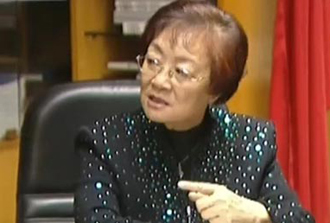Premier Wen Jiabao, known to most Chinese as down-to-earth “Uncle Wen”, may be at odds with his family members for their having used the family name to amass at least $2.7 billion in assets, according to an article published Friday in The New York Times.
The vast holdings of wealth are in the names of Wen’s family members, including his wife, mother, son, daughter, younger brother and brother-in-law. But the names were deliberately obscured behind layers of partnerships and investment vehicles involving friends, colleagues and business partners, reveals an in-depth investigation of financial records by The Times.
About $120 million worth of assets are held in the name of Wen’s 90-year-old mother Yang Zhiyun. While the investigation wasn’t able to establish whether Yang even knows that her name is linked to those assets, it was able to establish that the assets were accrued after Wen took office as vice prime minister in 1998 before becoming prime minister in 2003.
The holdings held in Yang’s name include a Beijing villa development; a tire factory in northern China; a company involved in building some of Beijing’s Olympic stadiums; and Ping An Insurance, one of the world’s biggest financial services companies.
The article suggests that the amassing of these assets was aided by Wen’s broad authority over the industries in which his family’s fortunes were made. Wen’s power and influence could be used as leverage by family members to multiply their investments.
Wen’s younger brother’s company was awarded more than $30 million in government contracts and subsidies to handle wastewater treatment and medical waste disposal for some of China’s biggest cities, the report found. The contracts were won after Wen tightened regulations on medical waste disposal in 2003 after the SARS outbreak.
In 2004 the State Council, over which Wen presides, exempted Ping An Insurance and other companies from rules that limited their scope. Soon after that Ping An raised $1.8 billion in IPO. Partnerships controlled by Wen’s relatives and their friends and colleagues had invested in the company before the IPO and reaped a fortune from their investments. In 2007, the last year the stock holdings were disclosed in public documents, the partnerships held as much as $2.2 billion worth of Ping An stock, according to The Times investigation as verified by outside auditors. Ping An’s overall market value is now nearly $60 billion.
A former colleague who had known Wen for 20 years said that the family members of all senior government officials held vast wealth through similarly shadowy entities. Consequently the leaking to the media of his family’s holdings suggests that Wen is being targeted by his enemies.
The review of corporate and regulatory records for 1992 through 2012 turned up no holdings in Wen’s name. However, his wife Zhang Beili, was found at the heart of many transactions that produced vast wealth for his other family members. As one of China’s top experts on gems and jewelry, Zhang managing state diamond companies that were later privatized. She helped relatives parlay their minority stakes in those companies into a billion-dollar portfolio of insurance, technology and real estate ventures.
The couple’s only son sold for $10 million a technology company he started to the family of Li Ka-shing, Hong Kong’s richest man. Through another investment vehicle he established New Horizon Capital, which has since grown into one of China’s biggest private equity firms, with partners like the government of Singapore.
Wen’s younger brother, Wen Jiahong, controls $200 million in assets.
“Wen is disgusted with his family’s activities, but is either unable or unwilling to curtail them,” a Chinese-born executive working at an American company in Shanghai told American diplomats, according to a 2007 cable released by WikiLeaks.


